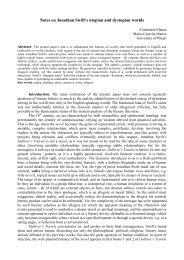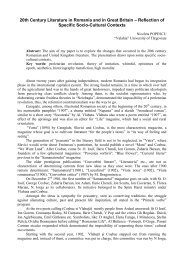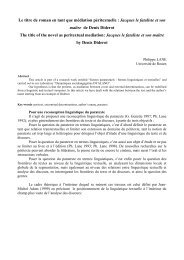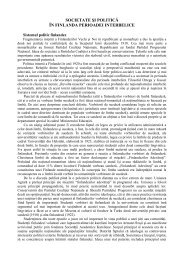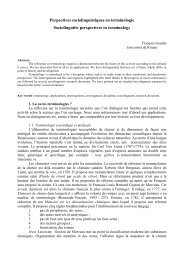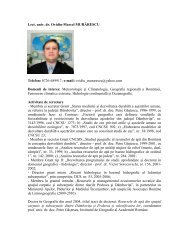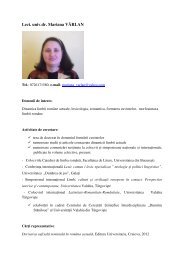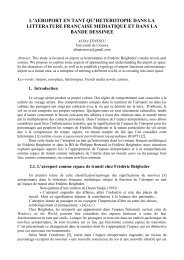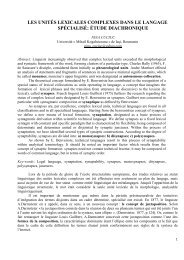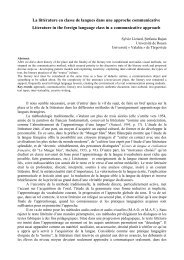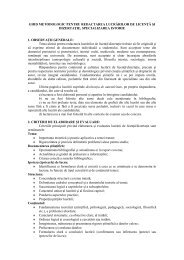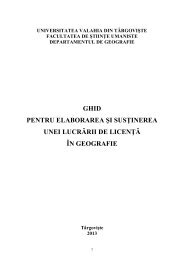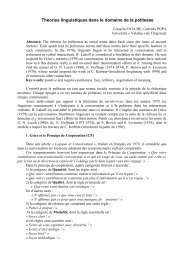THE ANNALS OF „VALAHIA” UNIVERSITY OF TÂRGOVIŞTE
THE ANNALS OF „VALAHIA” UNIVERSITY OF TÂRGOVIŞTE
THE ANNALS OF „VALAHIA” UNIVERSITY OF TÂRGOVIŞTE
You also want an ePaper? Increase the reach of your titles
YUMPU automatically turns print PDFs into web optimized ePapers that Google loves.
28<br />
The Annals of „Valahia” University of Târgovişte<br />
BINECUVÂNTA (to bless) < bine + cuvânta is a compound realized<br />
according to the pattern of the Slav blagosloviti ; this transitive verb of the first<br />
conjugation is used:<br />
• with reference to God: “a revărsa harul divin, a blagoslovi” (to pour divine<br />
grace, to bless),<br />
• with reference to priests: “a revărsa harul divinităŃii asupra unui lucru sau<br />
asupra oamenilor ; a blagoslovi” (to pour the grace of the divinity on a<br />
thing or on people, to bless). By analogy, “a dori prosperitate şi fericire<br />
cuiva (invocând adesea numele lui Dumnezeu)” (to wish prosperity and<br />
happiness to someone, invoking the name of God often);<br />
• with reference to people, who glorify the divinity, through their words: “a<br />
lăuda, a slăvi pe Dumnezeu” (to praise God); by analogy, it also mans “a<br />
lăuda, a preamări pe cineva în semn de recunoştinŃă” (praising someone as<br />
a sign of gratitude).<br />
BINECUVÂNTARE (blessing) – a compound term made up of bine +<br />
cuvântare – refers to the “action, formula or gesture of a binecuvânta (blessing)“.<br />
The term is present in the expression: A (a-şi) da binecuvântarea = “a fi<br />
de acord (cu ceva); a aproba” (to approve of something) (note 9).<br />
Synonyms: 1. (churchly) blagoslovire, (bookish) benedicŃiune, (popular)<br />
blagoslovenie, (old) urăciune;<br />
2. see preamărire (note 10).<br />
4. IUBIRE (LOVE)<br />
Most of the senses of the words considered polysemantic in the vocabulary<br />
of affection belong to the same domain, which, according to some researchers,<br />
makes the existence of the polysemy questionable. New senses develop according<br />
to a quite uniform model, in the case of the present term through the metonymy<br />
whole / part:<br />
IUBIRE = s.1 “sentiment de afecŃiune în general” (feeling of affection in general),<br />
s.2 “sentiment de afecŃiune pentru o persoană de sens opus” (feeling of<br />
affection for a person of the opposite gender).<br />
4.1. The lexicographic definitions increase the ambiguity of the<br />
interpretation of the sense as “sentiment of affection” (creating the impression of a<br />
semantic identity with: AFECłIUNE (affection) = main term of this class in the<br />
dictionaries of other languages, such as the Robert, for French).<br />
The access to the sense of the abstract words is difficult in the absence of the<br />
context; the importance of the context in the analysis of the abstract words must be<br />
correlated to their lack of referential autonomy, a feature considered as fundamental.




